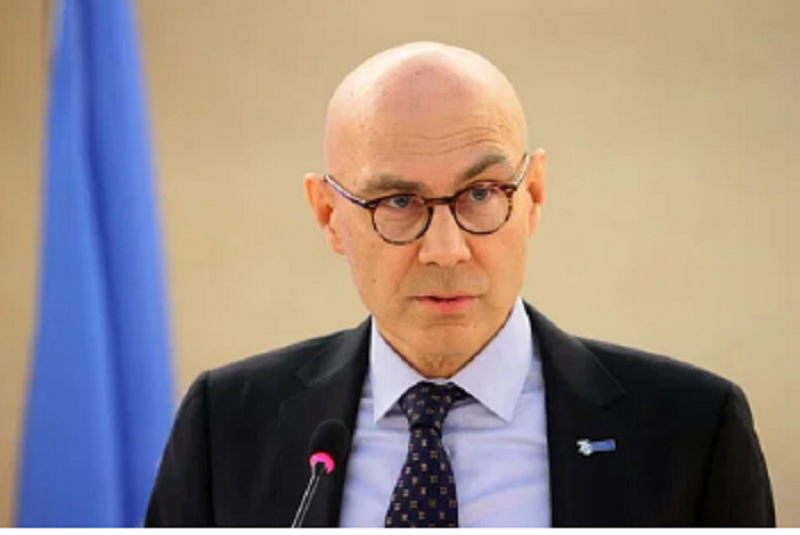New Delhi: The Rights and Risks Analysis Group (RRAG) has urged UN High Commissioner for Human Rights Volker Türk, who is visiting Bangladesh from October 29 to 30, to press the interim government of Bangladesh to allow the establishment of a UN human rights office in Bangladesh to address human rights violations in the country.
RRAG highlighted the interim government of Bangladesh’s failure to make public the report of the inquiry commission headed by the Additional Divisional Commissioner of Chittagong, Mohammad Nurullah Noori.
The commission was formed to investigate acts of violence against indigenous peoples in Dighinala, Khagrachari, and Rangamati from September 19 to October 1, 2024.
Chief Advisor Dr. Mohammad Yunus stated that issues faced by indigenous peoples in the Chittagong Hill Tracts would be addressed by the next elected government.
In these attacks by the Bangladesh Army and illegal settlers, at least four indigenous people were killed, 75 indigenous Jumma people were seriously injured, and 142 houses, shops, businesses, and Buddhist temples were looted, destroyed, or set ablaze.
The Hindu minorities in Bangladesh have also faced unprecedented acts of violence. While the daily Prothom Alo reported damage to 1,068 houses, businesses, and 22 places of worship from August 5 to 20, 2024, the Bangladesh Hindu Buddhist Christian Oikya Parishad reported 2,010 incidents of communal violence during the same period.
Despite providing unprecedented security during the Durga Puja celebrations from October 1st to 11th, 2024, Bangladesh Police reported that over 35 incidents related to the festivities had taken place.
“On one hand, Noble Laureate Dr Mohammed Yunus has washed off his hands on the indigenous peoples of the Chittagong Hill Tracts by stating that Peace Accord will be implemented by the next elected government. On the other hand, without investigation into the acts of violence against religious minorities, Dr Yunus had stated that these attacks took place because of their allegiance with the Awami League,” stated Suhas Chakma, Director of the RRAG.
He further said, “This exclusionary approach against indigenous peoples and religious minorities is reflected from the formation of the Constitutional Reforms Commission in which not a single religious minority or indigenous peoples’ representative was included. These issues need to be addressed.”
The RRAG also expressed concerns about the absolute lack of independence of judiciary in Bangladesh.
While five Supreme Court judges, including Chief Justice, were removed, 12 High Court judges have been denied allocation of judicial work because of the so-called students protests.
If any judge dares to release any leader or activist connected with former Prime Minister Shiekh Hasina government or Awami League, the judge will face the fury of the mob justice in the name of students.
Chakma further added, “The lack of judicial independence is affecting those accused in various cases. By August 31st, 2024, approximately 1,94,000 people, including 26,268 named individuals and around 168,000 unnamed persons, were accused in about 268 FIRs. Additionally, at least 54 journalists perceived as supporters of the previous Hasina-led government were charged with various offenses, including genocide and crimes against humanity, for their reporting.”
“Unless proceedings of the filed FIRs are halted and a Committee of Public Prosecutors is established to assess each FIR, thousands of unnamed individuals will suffer due to false prosecutions,” he said.
The Group also expressed concern that while innocent people are being prosecuted, at least 43 high-profile criminals and militants, including Mufti Jashimuddin Rahmani (chief of the Al-Qaeda-inspired militant outfit Ansarullah Bangla Team, now known as Ansar al Islam), who was convicted for the murder of blogger Rajib Haider, have been released on bail despite numerous pending cases.
ALSO READ: RRAG condemns arson and attack on Chakma Community in Bangladesh’s Chittagong Hill Tracts
Other top terrorists released include Abbas Ali alias ‘Killer Abbas’ of Mirpur, Sheikh Mohammad Aslam alias Sweden Aslam of Tejgaon, Imamul Hasan Helal alias Picchi Helal of Mohammadpur and Sanjidul Islam alias Emon who were named in the list of 23 top terrorists published by the home ministry on 26 December 2001.















